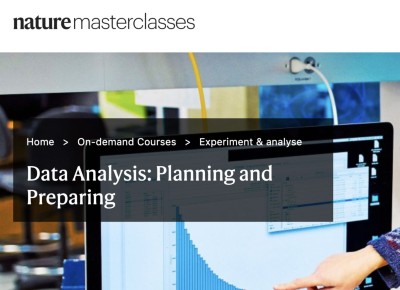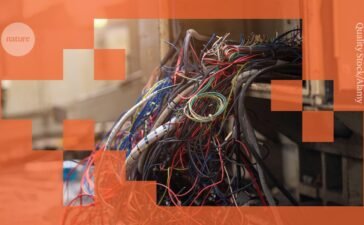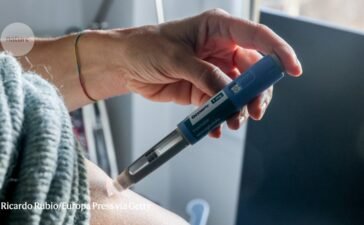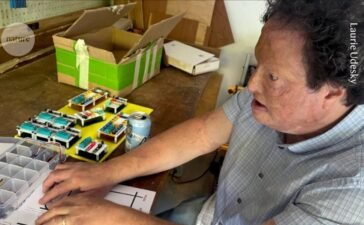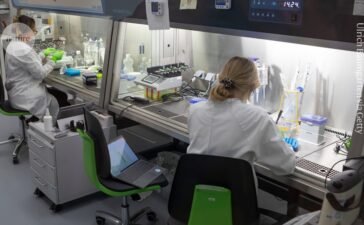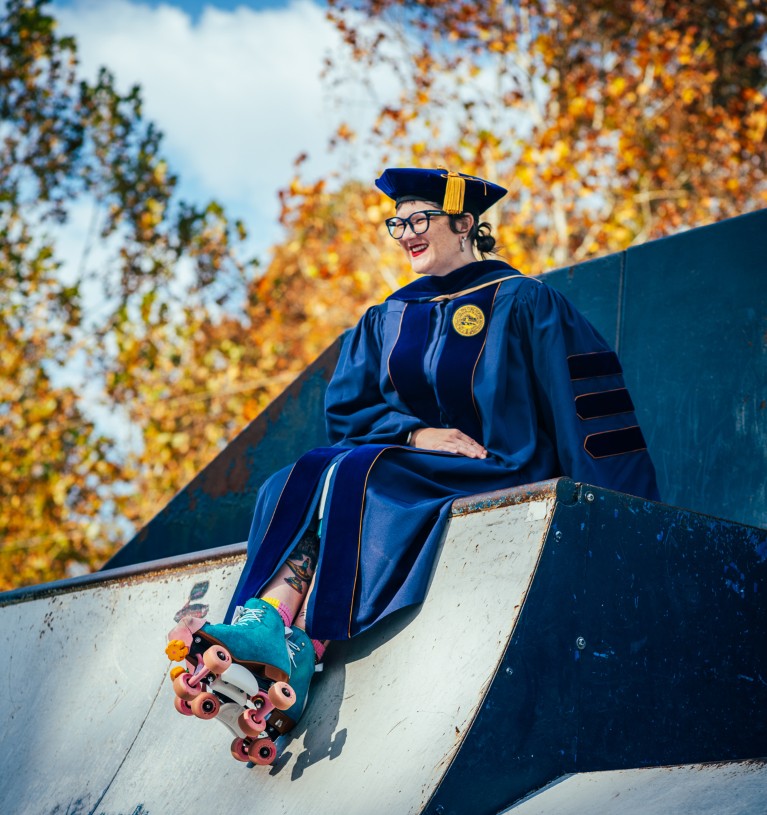
On a roll: Krista Bresock celebrates in her local skate park after graduating with a PhD in mathematics from West Virgina University, Morgantown, aged 41.Credit: Michael Germana
Krista Bresock sat crying in her professor’s office. She had to discuss one of five questions with her professor, in person. It was the concluding step of her final exam in functional analysis, the last course that she needed to complete for her PhD in mathematics. He’d shuffled a set of five cards, and she’d picked Card Number Two — corresponding to the one problem that she had not fully studied.
Unlike her fellow students studying intractable maths problems, Bresock was in her late thirties redoing coursework that she had failed years earlier. As a full-time maths teacher at West Virginia University (WVU) in Morgantown, she could find time to study only during nights and weekends.
“Problem Number Two was just collateral damage to being able to maintain this life of work full-time and be in grad school full-time,” Bresock remembers. She “fell to her knees” in relief when, a week later, she learnt she’d still got an A- in the course.
Many think of doctoral degrees as the domain of people in their twenties. Yet according to the US National Science Foundation, 17% of people who gained a PhD in science or engineering in the United States in 2022, the most recent year for which figures are available, were aged 36 or older. In some countries, including Colombia, Mexico, Portugal, South Korea, Iceland, Greece and Israel, the median age for entering a doctoral programme is 32 or higher, according to 2017 data from the OECD in Paris1.
Resources for mid-career scientists
A PhD requires a vast commitment of time and energy, often lasting five or more years. Stipends, when available, are often lower than salaries for other full-time jobs or professions. What’s more, students might have to move to another city, or even a different country, to attend their chosen course. Although difficult for any age group, those constraints can create different challenges for prospective students in their thirties, forties and beyond than for their younger colleagues.
At the same time, age often brings wisdom and self-confidence, qualities that can help older students to cope with a strenuous academic life. “The extra ten years that I was out doing other things gave me a lot of perspective and maturity to the way in which I think and live, and I think that was a big reason why I’ve succeeded,” says Peter Swanton, a 36-year-old graduate student working towards a doctoral degree in astrophysics at the Australian National University in Canberra.
Motivation is key
For Bresock, a doctoral degree represented “unfinished business”. She had struggled with alcohol and drug addiction from the age of 16, but hit a dangerous low point in early 2013, when she was a graduate student at WVU the first time round. She dropped out and checked herself into an in-patient programme, but still drank heavily afterwards. With the support of friends, family and Alcoholics Anonymous, she became sober in July 2013.
Bresock then taught maths at WVU, first as an adjunct and then as a full-time instructor, but she didn’t forget her incomplete doctorate. Finally, at the age of 37, she re-enrolled. “This little voice was like, ‘You have more to say. You have more to do. You have this thing sitting on the back burner that is kind of eating away at you,’” she says.
Despite her drive to finish the degree, motivating herself was “really hard sometimes”, she says, “because if I didn’t finish, no one would care: I would just not finish and still have this job and be fine.” One of her top tips for others looking to pursue a doctorate in mid-life is to fully understand and reflect on their motivations. If the goal is “more money”, that might not be enough, she says.
Before returning to his studies, Swanton held a variety of jobs, including hauling sugar cane, working in nightclub security and tutoring in secondary schools. He has this advice for anyone who’s considering a doctorate: make sure you’re “doing it because you love it”. For him, that has meant finding ways to combine telescopic investigations of cosmic objects, such as active galactic nuclei, with preserving folklore about the cosmos from the Gamilaraay, the people of his Aboriginal culture.
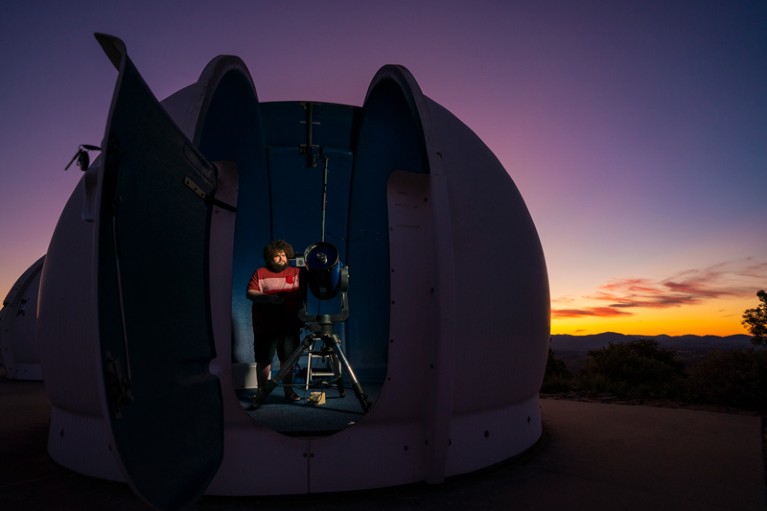
Peter Swanton, a 36-year-old graduate student in cultural astronomy at the Australian National University in Canberra, says that his previous work experience has given him the maturity to cope with the strains of academic life.Credit: Lannon Harley/ANU
Swanton’s heritage influences both his academic interests and the way in which he wants to communicate them. For example, the Gamilaraay language was originally a purely oral one. So, rather than just writing “a big block of text” for his dissertation, Swanton says that he would like to include elders and community members telling their own stories, and to bridge their knowledge with the Western understanding of the universe.
“My success has come down to finding something I am passionate about, and not concerning myself with future employability, which was the focus of my earlier attempts at academia and ultimately the reason why I didn’t succeed” at the time, he says.
Finding mentors
María Teresa Martínez Trujillo arrived at the Paris Institute of Political Studies to embark on a graduate programme in political science at the age of 32. Having spent her whole life up to that point in Mexico, she felt isolated from her classmates because of linguistic and cultural barriers, in addition to being the oldest student in her cohort. Martínez Trujillo had already had a career in the Mexican government, including working as an adviser to the secretary of the interior, yet she felt “less brave” than younger students, and had many more questions about reading materials.
She also felt ashamed about her lack of fluency in French. Over time, with the help of a therapist, she learnt to be less judgemental of herself and to overcome her impostor syndrome. Classmates helped her to proofread some of her assignments and she focused on improving her language skills.
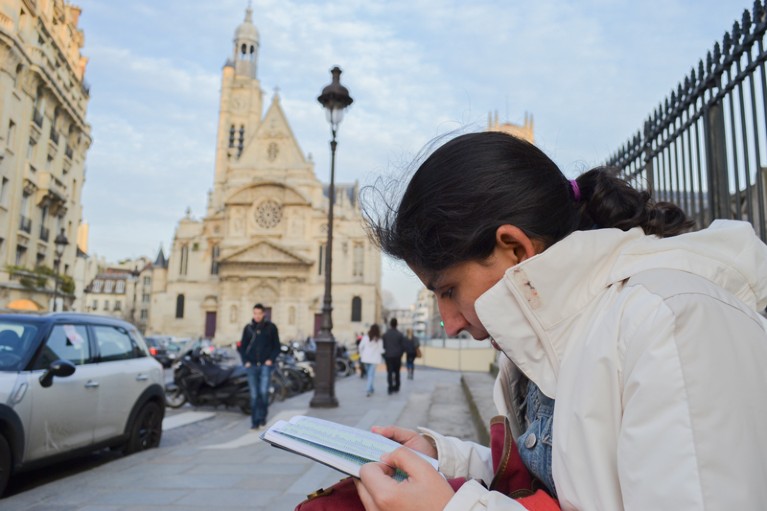
Cultural and linguistic barriers left María Teresa Martínez Trujillo feeling isolated from her peers when she arrived from Mexico, aged 32, to embark on a graduate programme at the Paris Institute of Political Studies.Credit: Hiram Romero
Martínez Trujillo’s advisers — Hélène Combes and Gilles Favarel-Garrigues — were key for her as she dived into reading and fieldwork on the relationship between drug trafficking and the business world in Morelia, Mexico, for her master’s project. “They let me go to the ‘forest’ and spend time and lose myself,” she says, adding that when she felt lost or stuck, her advisers helped her to find her way.
Time and money
Finances often pose a problem for graduate students who don’t already have savings and support, including those who have worked previously. Even with tuition covered, and a stipend to help towards living expenses, making ends meet can be challenging, especially for students who have other financial responsibilities, such as providing for family members or maintaining a home.
Martínez Trujillo received a stipend, but she spent almost all of it on rent and didn’t want to ask her family for money. She worked as a nanny, consulted for a Mexican think tank and spent summers working in Mexico on friends’ projects. “I’d never have free days,” she says.
Bresock wishes she could have spent more time away from both work and studies. “I did a terrible job of that. Make sure you make time for yourself. That dissertation will still be there, if you go take a walk, or if you go swim or whatever, for an hour out of your life.”
Training: Data Analysis: Planning and Preparing
Like Bresock, Marc Gentile kept a full-time job while doing his PhD in astrophysics at the Swiss Federal Institute of Technology in Lausanne in his mid-to-late-fortiess. He needed to earn enough to support both himself and his wife, and to address other financial responsibilities.
“The top advice would be establishing effective work and study habits right from the start,” he says. “In my case, time was the most precious resource, and I had to be very well organized to make the most of it.”
Gentile would work on his doctoral assignments from 5 a.m. to 6 a.m. each weekday, before leaving for his day job. He would then read articles while commuting by train, and tackle more PhD tasks or further reading in the evenings. “I was told that I was, on average, more productive and better organized than most other, younger students, because you develop such skills when you work professionally,” he said.
Family matters
When Wendy Bohon walked across the stage to receive her doctorate in geology, she was nearly 38 years old and pregnant with twins. She wound up at Arizona State University in Tempe after beginning her career as an actor, and then becoming fascinated with earthquakes after one shook her apartment in 1999.
For her dissertation, Bohon conducted fieldwork in India on two large fault systems, focusing on how fast they had been moving, their intersections and their frequency of earthquakes — as well as the growth of mountains around them — over the past 34 million years. Today, she heads the Seismic Hazards and Earthquake Engineering branch of the California Geological Survey in Sacramento.
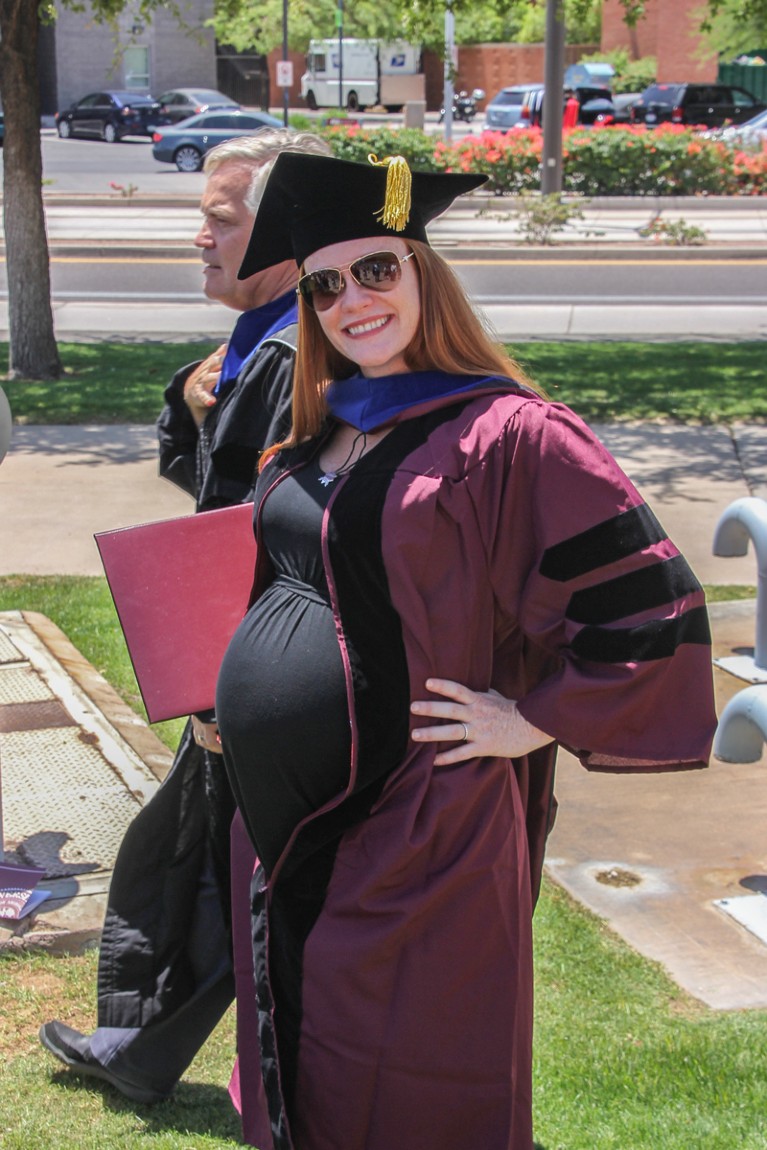
Wendy Bohon was nearly 38, and pregnant with twins, when she graduated from Arizona State University in Tempe with a PhD in geology.Credit: Linda Bohon
As a student, her desire to expand her family had put her in a different life stage from younger peers. She had met her husband, who already had a young daughter, while in her graduate programme. And whereas her classmates had wanted to avoid pregnancy, she had struggled to conceive. “That emotional disconnect and the difference in their reality and my reality — it was really tough,” she says. Ultimately, she and her husband chose to try the intensive process of in vitro fertilization, which Bohon mostly kept secret. At the same time, she was helping to co-parent her husband’s daughter, and the couple were given full custody of the girl when she was seven.
Bohon coped with parenting and finishing graduate school with the help of “a built-in village of people around who could step in to help us”. Other graduate students would play the card game UNO with the girl, or colour pictures with her. And Bohon’s mentor, along with the mentor’s husband, became the child’s godparents.
“In a lot of ways, it was easier to parent during my PhD, because my schedule was relatively flexible, so I could stay home with her when she was sick, or attend school functions,” Bohon says. What’s more, she adds, “having a kiddo that needed me helped me to set and keep healthier boundaries than I think I would have otherwise”.
Charlotte Olsen, a postdoctoral researcher in astrophysics at the New York City College of Technology, earned a PhD at the age of 42 and now investigates the factors that influence star formation and galaxy evolution. Olsen says that working on her doctorate presented challenges for her marriage. “I’m not gonna lie: grad school is really rough on a relationship,” she says — adding that, especially at the beginning, “it’s an incredibly stressful time”.
Among the responsibilities that older students might have is taking care of ageing parents. Olsen recalls that during her qualifying exams, she hadn’t heard from her mother, who was 76 years old at the time, for a while. She assumed that her mother wanted to give her space during that stressful time. Later, she found out that her mother’s appendix had ruptured, necessitating surgery and a stay in a hospital’s intensive-care unit.
Through it all, Olsen’s spouse was an invaluable source of emotional support. “Having somebody who is there with you along the way” helps a lot, she says.
What happens next?
Not everyone who gets a PhD stays in their field. Gentile, now 60, works as a data scientist for a Swiss television station. He had a postdoctoral research position for five years after graduation — but for several reasons, including financial ones, he could not find an academic job afterwards. “If I had really wanted to continue in astrophysics, then I would have had to move abroad; it’s difficult now,” he says.
Still, Gentile found the PhD experience rewarding and worthwhile. As well as acquiring problem-solving techniques, he learnt coding and data-science skills, such as machine learning and statistical methods. And he has used all of these in subsequent jobs, including his current one.
His graduate work also remains relevant. Some of the algorithms and software that he worked on during his PhD helped to inform the tools that scientists will use to analyse data from the European Space Agency’s Euclid observatory, which aims to explore dark energy and dark matter.
Bresock received a promotion at West Virginia University after earning her PhD in maths in December 2022, aged 41. Her dissertation examined how students understand the definite integral, a fundamental concept in calculus, when solving different kinds of problem.
Today, she has greater empathy for her own students because of her own struggles as a graduate student. Finishing her doctorate remains one of her most satisfying accomplishments, she says. “When people ask me what’s the biggest thing I’ve ever done in my life, it’s: get sober, and then, finish my PhD. That’s a close second.”



